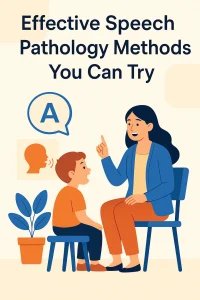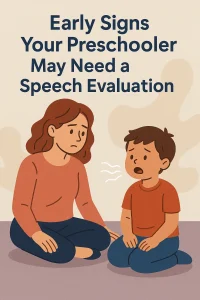Conquer Speech Challenges: Adult Speech Therapy Evaluation
By Rajini D
Last Updated: April 12, 2024
Are you or a loved one about to begin the journey of adult speech therapy? It’s a path that often comes with a mix of feelings—perhaps excitement, curiosity, and even a little nervousness. That’s completely understandable! Taking steps toward clearer communication is a big decision, and it can feel both empowering and overwhelming at the same time.
But don’t worry—you’re not alone. Understanding what to expect from an adult speech therapy evaluation can help ease those uncertainties. This crucial first step isn’t just about pinpointing challenges; it’s about crafting a personalized roadmap for your communication goals. So, if you’re wondering what happens during an evaluation and how you can best prepare, we’re here to guide you every step of the way. Let’s dive in!
Read More: Adult Speech Therapy: What Is It and How It Can Help
Understanding Adult Speech Therapy Evaluation
Embarking on the journey of speech therapy begins with a crucial first step: the evaluation. But what exactly is an adult speech therapy evaluation? In simple terms, it’s a detailed assessment carried out by a certified speech-language pathologist to understand the communication strengths and challenges that you or your loved one may be facing. This evaluation forms the foundation of any effective therapy program, tailored to improve speech, language, or cognitive communication skills in adults.
Whether you’re dealing with articulation issues, fluency concerns, or cognitive challenges that affect communication, the evaluation is designed to create a personalized approach that addresses your unique needs.
Purpose of the Evaluation
The main goal of an adult speech therapy evaluation is to get a clear picture of your speech and language abilities. During the evaluation, the SLP will assess various aspects of communication, including:
- Articulation: How clearly you pronounce words.
- Fluency: If you experience stuttering or other disruptions while speaking.
- Voice: The quality, pitch, and volume of your voice.
- Language comprehension: Your ability to understand and process language.
- Oral motor skills: The movements of your lips, tongue, and jaw that affect speech.
For example, imagine an adult who struggles with stuttering. During their evaluation, the SLP might ask them to read aloud or have a conversation to analyze the fluency of their speech. Based on these observations, the therapist can pinpoint where the challenges lie and design therapy sessions that specifically target these areas.
Benefits of the Evaluation
A speech therapy evaluation comes with several key benefits that help you get the most out of your therapy experience. Here are the main ones:
1. Personalized Care
Everyone has different communication challenges, so the evaluation ensures your therapy plan is customized just for you. For example, if you’re having trouble with your voice after an illness, the therapist will create exercises that focus on strengthening your voice. This personalized approach makes therapy more effective and relevant to your needs.
2. Goal Setting
During the evaluation, you and your therapist will set clear goals. These goals guide your therapy sessions. For instance, if you want to improve your public speaking, the therapist will help you work on clearer speech or reducing stuttering. Setting specific goals helps track progress and keeps you motivated.
3. Informed Decisions
The evaluation helps your therapist decide the best plan for you. This includes how often you should have sessions, which techniques to use, and if you might need to see other specialists. For example, if the evaluation shows cognitive issues, the therapist may recommend seeing a neurologist or another expert.
4. Empowerment
Understanding your communication strengths and challenges gives you the power to take an active role in your therapy. When you know exactly what you’re working on and why, you can focus better on your exercises and feel more confident in your progress.
A speech therapy evaluation isn’t just about figuring out where you need help—it’s the first step toward better communication and more confidence in everyday situations.
Reasons for Seeking Speech Therapy
Speech therapy helps improve communication, whether it’s speaking more clearly or understanding others better. Many adults seek speech therapy for different reasons, and here are some common conditions that often require it:
Dysphasia (Swallowing Difficulties)
Dysphasia means having trouble swallowing, and it can happen after a stroke or because of other health issues. This condition also affects speech since the muscles used for swallowing are the same ones needed for talking clearly. For example, an adult who has had a stroke might have slurred speech along with swallowing difficulties. Speech therapy can help by strengthening these muscles to improve both speech and swallowing.
Stuttering
Stuttering is when a person repeats words, stretches sounds, or has pauses while speaking. This can make communication difficult and affect confidence in social situations. For example, a person might get stuck on certain words while talking. In therapy, adults learn techniques to help them speak more smoothly and feel more comfortable when speaking.
Apraxia of Speech
Apraxia of speech is when the brain has trouble sending signals to the muscles needed for speech. Adults with apraxia know what they want to say, but their speech comes out unclear or mixed up. For instance, someone with apraxia might struggle to say longer words correctly. Speech therapy helps by practicing speech movements and sounds to make speech clearer over time.
Dysarthria
Dysarthria happens when the muscles used for speech are weak or uncoordinated, often due to brain injuries or neurological issues. This can make speech sound slurred or slow. For example, an adult who has had a brain injury might have difficulty speaking clearly. Therapy focuses on strengthening speech muscles and improving breath control to help them speak more clearly.
Aphasia
Aphasia is a condition caused by brain damage, often from a stroke, that affects a person’s ability to speak, understand, read, or write. For example, someone with aphasia may have trouble forming sentences or understanding others. Speech therapy helps by working on language skills and finding new ways to communicate effectively.
Pre-Evaluation Preparation: Setting the Stage for Success
Preparing for your adult speech therapy evaluation can help ensure a smooth and successful session. Here are some practical steps to get ready and feel more confident:
Finding the Right Space
- Quiet and Comfort: Pick a quiet and comfortable spot where you can speak without interruptions. This could be a cozy room at home or a quiet corner in your office. The goal is to be somewhere calm so you can focus during the evaluation.
- Good Internet Connection: If your evaluation is online, make sure your internet connection is strong. A wired connection is often more reliable, but if you’re using Wi-Fi, sit close to the router to avoid connection problems.
Technical Checklist
- Testing Microphone and Camera: Test your microphone and camera ahead of time. This ensures that the speech therapist can clearly hear and see you, which is vital for a successful evaluation.
- Updating Software: If you’re using a video platform like Zoom or Skype, check that you have the latest version. Outdated software can cause frustrating technical glitches during your session.
Knowing What to Expect
During your speech therapy evaluation, the therapist will assess your communication abilities. You’ll have the chance to share your concerns and goals, and the therapist may use different tools to better understand your needs. For example, they might ask you to read aloud or describe a picture to evaluate how you communicate. Knowing this helps ease any nervousness.
The Role of Intake Questionnaires
Before your evaluation, you may need to complete an intake questionnaire. This form is an important part of the process—it helps the therapist learn about your medical history, communication challenges, and any past therapies you’ve tried. At Wellness Hub, we use this information to personalize your therapy plan, making it as effective as possible for your unique situation.
The Evaluation Process: A Step-by-Step Guide
Starting your speech therapy journey begins with a thorough evaluation. This process, led by experienced speech-language pathologists, helps to assess your communication abilities and identify any challenges. At Wellness Hub, we make sure the environment is supportive and non-intimidating. Let’s walk through the steps you can expect during the evaluation.
Interviews
- Initial Consultation: The evaluation typically starts with a conversation between you and the therapist. You’ll discuss your concerns, goals, and any specific difficulties you’ve been facing. For example, if you’re struggling with stuttering, you’ll have the opportunity to explain how it affects your daily life. This helps the therapist tailor the evaluation to your individual needs.
Oral Mechanism Examination
- Physical Assessment: In this step, the therapist will check the physical structures involved in speech. This includes examining your jaw, tongue, palate, and facial muscles. For instance, if someone has difficulty moving their tongue properly, it could affect how clearly they speak. The therapist ensures everything is functioning correctly to support speech.
Also Read: Discover the Best Oral-Motor Exercises for Adults
Articulation/Phonology Assessment
- Speech Sounds: Here, the therapist evaluates how you produce different sounds and how they form into words. If certain sounds are hard to pronounce, it can make speech unclear. For example, if someone struggles with the “r” sound, speech therapy can help improve articulation to make words easier to understand.
Voice and Fluency Assessments
- Voice Quality: This part of the evaluation focuses on how your voice sounds. The therapist will check things like pitch, volume, and any strain you might be experiencing. For example, if someone has vocal nodules, it may cause hoarseness or difficulty speaking clearly, and the evaluation will help diagnose such issues.
- Speech Flow: If you have trouble with stuttering or another fluency disorder, this step will assess the flow of your speech. The therapist will listen for any interruptions or patterns that could affect how smoothly you speak.
Know more: Understanding Speech Chain: Key to Better Communication
Language and Cognition Assessments
- Understanding and Using Language: This part looks at your ability to understand what others say and how well you express yourself. For instance, the therapist may assess your vocabulary and grammar or how you use language in conversations.
- Cognitive-Communication: This assessment checks cognitive skills like memory, attention, and problem-solving, which all play a role in effective communication. For example, someone recovering from a stroke may have trouble remembering words or following conversations, and this evaluation helps to address those specific needs.
Speech Therapy Evaluation Components
| Component | Description |
|---|---|
| Interviews | This is where the therapist and patient have initial discussions about the patient’s concerns, goals, and reasons for seeking therapy. It helps the therapist tailor the evaluation and subsequent therapy sessions to the individual’s needs. |
| Oral Mechanism Examination | A thorough physical examination of the mouth, throat, and facial muscles to check for any physical abnormalities that could affect speech. This includes observing movement and coordination of the tongue, lips, jaw, and palate. |
| Articulation/Phonology Assessment | This component evaluates how well the patient produces individual sounds and sound patterns. It helps identify issues with pronunciation, clarity of speech, and the ability to form words correctly. |
| Voice and Fluency Assessments | These assessments focus on the quality, pitch, and volume of the voice, as well as the smoothness of speech. They are crucial for diagnosing conditions like stuttering, vocal nodules, or other voice disorders. |
| Language and Cognition Assessments | These tests measure both receptive (understanding) and expressive (speaking) language skills, as well as cognitive functions like memory, attention, and problem-solving abilities that support communication. |
Tips for a Successful Speech Therapy Journey
Embarking on a speech therapy journey is a meaningful step towards improving your communication skills. Just like any journey, it requires dedication, patience, and active participation. Here are some simple tips to help make your speech therapy experience as successful as possible.
Practice Makes Perfect
- Consistent Practice: The techniques and exercises you learn in therapy are meant to be practiced regularly at home. Consistency is key! For example, if your therapist teaches you how to improve articulation, practicing these exercises daily will help you use them more naturally in conversations.
- Incorporate Exercises into Daily Routines: Try to include your speech exercises in everyday activities. For instance, practice breath control exercises while walking or doing chores, or work on pronunciation by reading aloud to yourself. This makes practice easier and part of your daily life.
Embrace Patience
- Celebrate Small Victories: Progress can be slow, but every small improvement matters. Whether you manage to pronounce a tricky word correctly or speak more clearly in a conversation, celebrate these moments as steps towards your larger goals.
- Understand That Setbacks Are Normal: There will be times when progress feels slow, and that’s okay. Everyone experiences challenges on their journey, and setbacks are a normal part of learning. Stay patient and keep pushing forward.
Be an Active Participant
- Engage Fully in Sessions: Actively participating in therapy sessions is essential. Share your concerns, challenges, and progress openly with your therapist. The more involved you are, the more they can customize the therapy to suit your needs.
- Set Realistic Goals: Work with your therapist to set goals that are realistic and achievable. For example, if improving fluency is your goal, break it down into smaller, measurable steps, like speaking smoothly in short sentences before moving to longer conversations.
Leverage Resources and Support
- Utilize Wellness Hub’s Resources: At Wellness Hub, we offer a range of resources to support your therapy journey, from helpful articles to personalized tools. Make the most of these to reinforce your learning and stay on track.
- Seek Support from Others: Having support from family, friends, or even a speech therapy support group can make a big difference. Sharing your experiences and tips with others on a similar journey can keep you motivated and encouraged.
Conclusion
Starting speech therapy as an adult is a big step toward improving communication and gaining confidence. The evaluation is the first important step that sets the stage for a personalized therapy plan tailored just for you. By understanding what to expect and actively participating, you can make steady progress. Every small victory counts, and with dedication and the right guidance, you’ll see real improvement. Ready to take control of your communication? Wellness Hub is here to help! Visit our website, Wellness Hub for resources and support on your speech therapy journey.
Frequently Asked Questions:
1. What is an adult speech therapy evaluation?
An adult speech therapy evaluation is a detailed assessment conducted by a speech-language pathologist (SLP) to identify your speech, language, voice, and swallowing abilities and challenges. This evaluation forms the basis for any personalized therapy plan.
2. How do I prepare for my speech therapy session?
Prepare by finding a quiet, comfortable space with a good internet connection if the session is online. Test your computer’s microphone and camera, and ensure any needed software is up to date. Also, fill out any intake questionnaires provided by your therapist.
3. What happens during a speech therapy evaluation?
During the evaluation, your speech therapist will review your medical history, conduct interviews to understand your concerns and goals and perform various assessments. These assessments might include oral mechanism examination, articulation/phonology assessment, and voice and fluency assessments, among others.
4. Can adults benefit from speech therapy evaluations?
Yes, adults can significantly benefit from speech therapy evaluations. These evaluations help diagnose any speech and language disorders and create a tailored therapy plan to improve communication abilities.
5. What are common conditions that require speech therapy for adults?
Common conditions include dysphasia (swallowing difficulties), stuttering, apraxia of speech (difficulty coordinating muscle movements for speech), dysarthria (weak or difficult-to-control speech muscles), and aphasia (language disorder caused by brain damage).
6. What tips can help me succeed in speech therapy?
Success in speech therapy comes from regular practice, patience, active participation in sessions, and setting realistic goals. Additionally, utilizing resources and support from your therapy center, like Wellness Hub, can enhance your progress.
7. How does Wellness Hub support patients in speech therapy?
Wellness Hub supports patients by offering personalized care plans, resources for practice and learning, and a supportive environment for therapy. Our experienced speech-language pathologists are dedicated to helping you achieve your communication goals.
8. What should I expect after my speech therapy evaluation?
After your evaluation, the speech-language pathologist will discuss their findings with you, including any speech or language issues identified and whether speech therapy is recommended. If therapy is advised, they will outline a personalized treatment plan tailored to your specific needs and goals.
9. How long does an adult speech therapy session last?
The length of a speech therapy session can vary, but most adult speech therapy sessions last between 45 to 60 minutes. This duration allows enough time for various therapeutic activities and discussions between you and your therapist about progress and strategies.
10. Can speech therapy be done online, and is it effective?
Yes, speech therapy can be conducted online through teletherapy sessions, which have been shown to be effective for many individuals. Online therapy provides flexibility and convenience, allowing for consistent therapy sessions without the need for travel, and it has been successfully used to treat a wide range of speech and language disorders.
About the Author:
Rajini Darugupally
M.Sc., Speech-Language Pathologist (9+ years of experience)
Rajini is a passionate and dedicated Speech-Language Pathologist with over 9+ years of experience, specializing in both developmental speech and language disorders in children and rehabilitation in adults. Driven by a desire to empower each individual to find their voice, Rajini brings a wealth of experience and a warm, genuine approach to therapy. Currently, at Wellness Hub, she thrives in a team environment that values innovation, compassion, and achieving results for their clients.
Book your Free Consultation Today
Parent/Caregiver Info:
Client’s Details:
* Error Message









